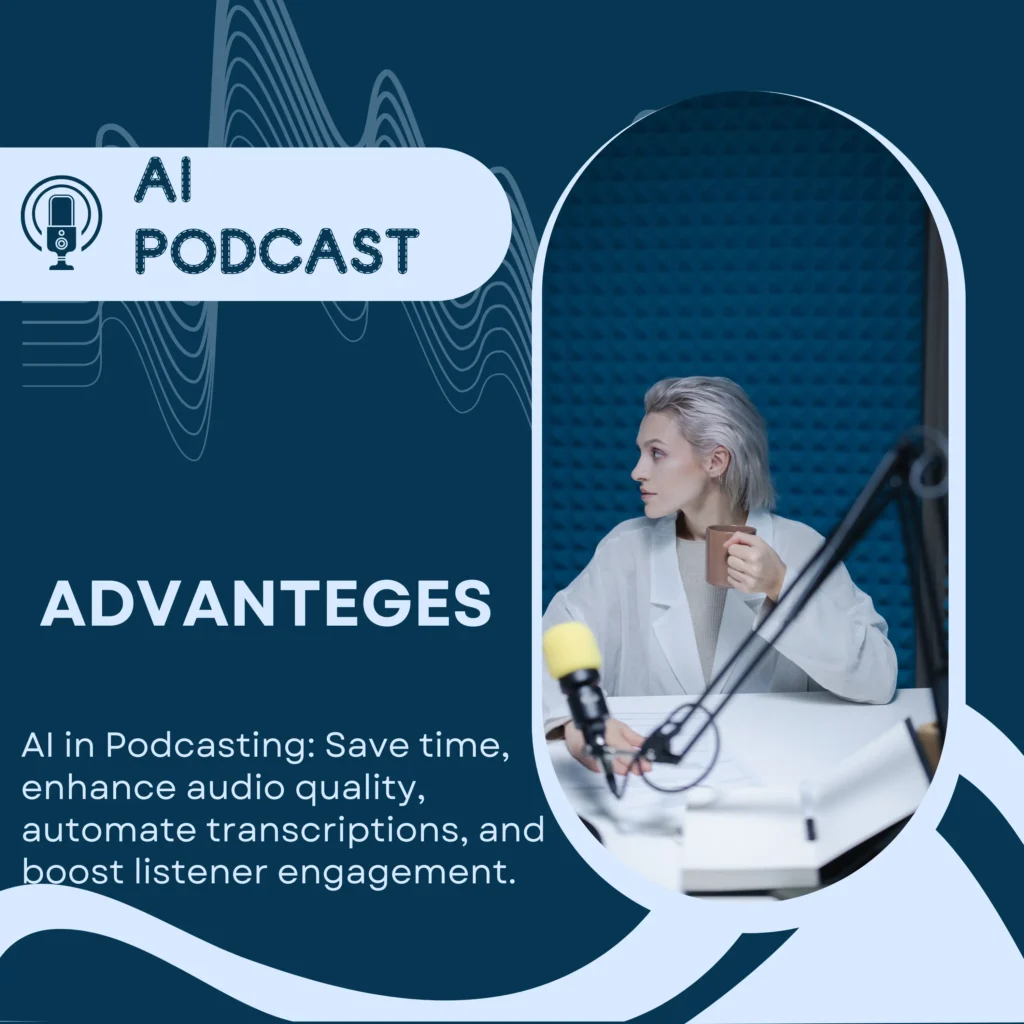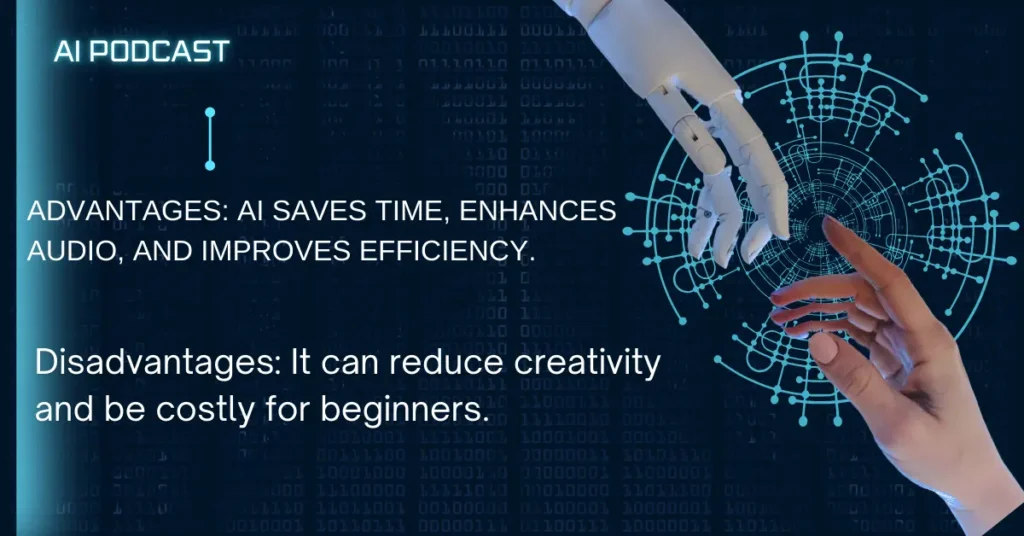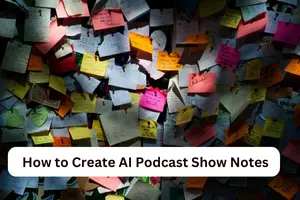Advantages and Disadvantages of AI in Podcast Production
Published: 10 Dec 2024
Podcasting has evolved tremendously over the past decade, with the rise of AI-powered tools bringing a new era of innovation to the industry. From automating editing to generating transcriptions, AI is changing how podcasters create, produce, and distribute content.
But is AI really the future of podcasting, or are there drawbacks to this technology? In this article, we’ll explore the advantages and disadvantages of AI in podcasting and help you decide whether it’s worth integrating AI into your podcasting workflow.
Advantages of AI in Podcasting:
AI automates transcription, editing, and show note creation, saving hours of work.
Improved Audio Quality:
AI tools like Auphonic and Adobe Enhance Speech automatically enhance sound, remove background noise, and balance audio.
Efficient Transcriptions and Show Notes:
AI can quickly transcribe episodes and generate show notes with key points and timestamps.
Personalized Content Recommendations:
AI recommends podcasts to users based on listening behavior, improving discoverability.
Advanced Analytics:
AI provides insights into listener behavior and engagement, helping podcasters tailor content for growth.
.How to Create AI Podcast Show Notes in 2024

What is AI in Podcasting?
Artificial Intelligence (AI) in podcasting refers to the use of technology to assist with various aspects of podcast production. AI tools can automate repetitive tasks, enhance audio quality, create show notes, and even provide personalized content recommendations for listeners. Popular tools like Descript, Otter.ai, and Auphonic are already being used by podcasters to improve their workflow and increase efficiency.
As podcasting becomes more competitive, the need for high-quality content and streamlined production processes has never been higher. AI can help podcasters reduce the time spent on editing and technical tasks, allowing them to focus more on content creation.
Advantages of Using AI in Podcasting
Time-Saving Automation
One of the most significant advantages of AI is its ability to automate repetitive tasks that would otherwise consume hours of a podcaster’s time. AI transcription services like Otter.ai or Sonix can automatically transcribe entire episodes, turning your spoken words into text in a matter of minutes. This means you don’t have to manually type out show notes or transcriptions—AI does it for you!
AI can also automate audio editing. Tools like Descript use AI to edit podcast audio by detecting unwanted sounds, pauses, and background noise. This can drastically reduce the time spent on editing, making it more efficient for podcasters to produce consistent content without getting bogged down in the technical aspects.
Why it matters: This time-saving benefit is essential for podcasters who need to publish content consistently but don’t have the time to spend on manual editing or transcription.
Enhanced Audio Quality
Audio quality is a major factor in retaining listeners. Poor sound quality can make even the most engaging content feel difficult to listen to. With AI tools like Auphonic and Adobe Enhance Speech, podcasters can easily improve their audio recordings by automatically removing background noise, enhancing voice clarity, and adjusting audio levels.
AI-driven audio enhancement tools analyze the audio and make adjustments that might take hours for a manual editor to achieve. This means you can achieve a professional-sounding podcast without needing high-level audio engineering skills.
Why it matters: High-quality audio helps retain your audience’s attention and establishes your podcast as professional-grade content.
Advantages and Disadvantages of AI in Podcast

AI-Powered Show Notes and Transcriptions
Show notes are an essential part of any podcast as they provide listeners with a summary of each episode, key points, and timestamps. But writing them manually can be time-consuming. AI tools like Descript or Otter.ai can generate show notes automatically by transcribing the podcast episode and summarizing the key points.
In addition to show notes, AI tools can provide detailed transcriptions, making your podcast more accessible to people with hearing impairments. Transcriptions can also improve your podcast’s SEO, making it more discoverable in search engines.
Why it matters: Automatic show notes and transcriptions make your podcast more accessible and help it rank better in search engines, ultimately expanding your reach.
Personalization and Recommendations
AI can also enhance the user experience by offering personalized content recommendations based on listener behavior. Streaming platforms like Spotify and Apple Podcasts use AI to suggest podcasts to listeners based on what they’ve previously listened to, improving the chances that your content will be recommended to a new audience.
Why it matters: AI recommendations help you reach new listeners who might be interested in your podcast, expanding your audience base.
Advanced Analytics for Growth
AI tools can analyze listener behavior, providing podcasters with insights into their audience’s preferences. Platforms like Podtrac and Chartable track listener engagement, such as play count, retention rate, and demographics, which helps you understand what content works and what doesn’t.
This type of data-driven insight allows podcasters to tailor their content, improving audience engagement and long-term growth. It can also help in identifying trends and adapting quickly to changes in the podcast landscape.
Why it matters: Knowing what content resonates with your audience enables you to create more targeted, effective episodes, leading to improved listener retention.
Disadvantages of Using AI in Podcasting
Over-reliance on AI can reduce the emotional connection and personality in podcasting.
Learning Curve:
Some AI tools can be complex to use, especially for beginners without technical expertise.
Over-Reliance on Technology:
Excessive dependence on AI could stifle creativity and originality in content creation.
Cost of Premium Tools:
High-quality AI tools often require a paid subscription, which may be a barrier for new podcasters.
Limitations in Complex Editing:
AI struggles with advanced audio tasks like nuanced mixing and sound design, which require human intervention.
While AI offers several advantages, there are some drawbacks to consider as well.
The Risk of Losing the Human Touch
AI tools can automate many aspects of podcast production, but they cannot replicate the authenticity, storytelling, and emotional connection that a human host can provide. For example, while AI can edit out awkward pauses or filler words, it can’t capture the unique voice and perspective that a human brings to the table.
Why it matters: Podcasting is an intimate medium, and listeners often connect with the personality of the host. Over-reliance on AI may strip away that personal touch, making the content feel less relatable.
Learning Curve and Complexity
Not all AI tools are easy to use. While some platforms are designed for beginners, others come with a steep learning curve. Understanding how to effectively use AI-powered transcription services, editing software, or analytics tools can take time.
Why it matters: If you’re a beginner podcaster, the time spent learning these AI tools might detract from your ability to create content, potentially leading to frustration.
Over-Reliance on Technology
AI tools are designed to assist, not replace, the creative aspects of podcasting. If you become too reliant on AI, there’s a risk of losing the innovative and personal touch that sets your podcast apart from others.
Why it matters: While AI can save time and improve quality, it can’t replace the creativity and connection that human hosts bring to their shows.
Costs of Premium Tools
Many advanced AI tools come with a subscription or licensing fee. Platforms like Descript, Auphonic, or Podtrac offer premium features that require payment. For podcasters on a budget, these costs can add up over time.
Why it matters: While free AI tools exist, the best features often come with a price tag, which may be prohibitive for podcasters just starting out.
Limitations in Complex Editing
AI tools excel at tasks like noise reduction and basic editing, but they may struggle with more complex audio tasks, such as nuanced sound design or mixing multiple audio tracks creatively. For podcasts with high production value, AI might not be sufficient to meet all the technical needs.
Why it matters: If your podcast requires advanced audio mixing or creative sound design, you may still need to rely on manual editing or professional audio engineers.
Conclusion:
AI in podcasting offers significant advantages, from automating repetitive tasks to enhancing audio quality and improving listener engagement. For podcasters looking to streamline their workflow and make their content more accessible, AI tools can be a game-changer.
However, it’s important to strike a balance. AI should complement your creative process, not replace it. While AI can automate tasks like editing and transcription, it can’t replace the personal touch and storytelling that make podcasts unique.
How can AI improve the quality of my podcast?
AI can enhance podcast quality by automating tedious tasks like audio editing, transcription, and show notes creation. Tools like Auphonic and Descript can clean up background noise, adjust audio levels, and improve voice clarity, resulting in professional-sounding podcasts without the need for advanced technical skills.
. Are there any downsides to using AI in podcast production?
Yes, while AI can save time and improve efficiency, it may also lead to a loss of the personal touch in your content. Over-relying on AI might result in robotic-sounding episodes or reduce the creative aspects that make your podcast unique. Additionally, there is a learning curve to mastering AI tools, and premium AI services can be costly.
3. Is AI worth using for small podcasts?
AI tools can be very beneficial for small podcasters, especially those with limited time or technical skills. Automation tools for editing, transcriptions, and show notes can save you hours of work. However, it’s important to balance AI’s efficiency with your creative voice to maintain the personal connection with your audience.
Proudly powered by WordPress

- Be Respectful
- Stay Relevant
- Stay Positive
- True Feedback
- Encourage Discussion
- Avoid Spamming
- No Fake News
- Don't Copy-Paste
- No Personal Attacks

- Be Respectful
- Stay Relevant
- Stay Positive
- True Feedback
- Encourage Discussion
- Avoid Spamming
- No Fake News
- Don't Copy-Paste
- No Personal Attacks






